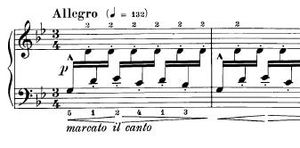 Image via Wikipedia\
Image via Wikipedia\Hello Everyone,
So maybe you play in a band, learned some piano, or just want to write music. Well, writing music is rewarding and exciting. If you get good at it, other people will love to hear your music and might even pay you for it!
In any case, learning how to write music is not easy. Here are a few pointers on learning how to write music:
- Learn basic keyboard. Piano lessons help you learn about music theory, chords, and melodies without having to wade through crazy theory books. Plus, then you will be able to write much easier.
- Do you want to write pop or classical? For pop, you can get away with a lead sheet (pretty much just chords, melody line, and basic rhythm). If you want to write for something a bit more advanced, then you will need to learn about music notation. There are lots of online sites that will start you out on that. (I can answer any questions, too). For jazz, classical training is helpful, but not necessary. Some computer programs that will write the music for you (ex. Garageband, Logic, Cakewalk). You play, and it prints it right out!
- Get feedback on your writing. Whether its a teacher, a peer, or just a friend in the band, you need to get some feedback when you write, especially at the beginning.
- If you take composition lessons, be sure that the teacher writes what you want to write. You don't want to take lessons from someone that only writes string quartets if you want to arrange for big band or rock.
- Get the materials you need: rhyming dictionary, orchestration book, book on notation, sheet music (print some online), pencils, a keyboard, pencil sharpener
Tell me about your music adventures or post any questions in the comments below!
Happy writing,
Sabrina Pena Young



Comments